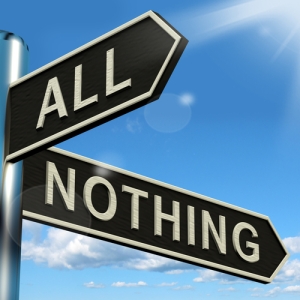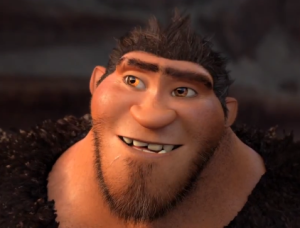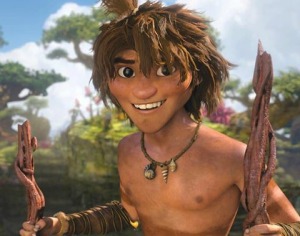I really hate it when I repeat myself, but the truth is I do it all the time. As much as I try to stop myself from telling the same stories or writing about the same topics, I catch myself doing it frequently. At least with what I’m about to write here, I realize I’m doing it, and I acknowledge it freely.
I know I have written here about dichotomous reasoning, but when I did it before it was in reference to that also being recognized as “black-and-white thinking.” Things were either good or bad, right or wrong, and there was no in-between. Dichotomous thinking also refers, however, to “all-or-nothing thinking.”
 All-or-nothing thinking can manifest itself in a number of different ways. For example, there’s perfectionism, where a person might insist on knowing a project will turn out perfect or just not start it at all. My issue with all-or-nothing thinking is a pass/fail mentality. Either what I do or have done is a complete success or it is a total failure. There is no “pretty good” or “acceptable,” and there is no room for the possibility that an outcome I haven’t seen yet could come true. I either succeed or I fail, and that’s that.
All-or-nothing thinking can manifest itself in a number of different ways. For example, there’s perfectionism, where a person might insist on knowing a project will turn out perfect or just not start it at all. My issue with all-or-nothing thinking is a pass/fail mentality. Either what I do or have done is a complete success or it is a total failure. There is no “pretty good” or “acceptable,” and there is no room for the possibility that an outcome I haven’t seen yet could come true. I either succeed or I fail, and that’s that.
I have sort of a big week coming up, and I am trying my darndest to realize that the outcomes of upcoming events are not going to define me or lock me into an irreversible future I won’t be able to escape from. I’m also trying to remember that even if every plan I make this week goes awry, it does not mean that I am a complete failure, and it does not mean that I am doomed forever. Sounds easy enough, doesn’t it?
I wish it were that easy. The more I come to learn about dichotomous thinking, the more I realize it is one of the more insidious aspects of depression. It terrifies a person, mainly because they constantly feel as if they are on the brink of falling into utter ruin. Anytime I have lost a job or been passed over for an opportunity or gotten a poor grade on an exam or struck out in a baseball game, I felt like my life was over. It obviously wasn’t; I’m still here. But I live in this uncomfortable place most of the time, where it feels as if the knockout blow is just around the corner.
Tomorrow, I will try to kick off a week of keeping dichotomous thinking at bay. It’s already tugging at me, and it almost makes me want to just pass on some things out of sheer terror. I won’t know the results unless I try, though, so I just have to put one foot in front of the other and take things one step at a time. I need to repeat those words over and over and over…


